第三单元 词义的选择
- 格式:pptx
- 大小:144.01 KB
- 文档页数:46
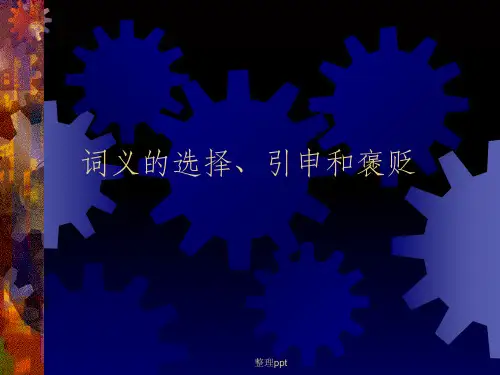
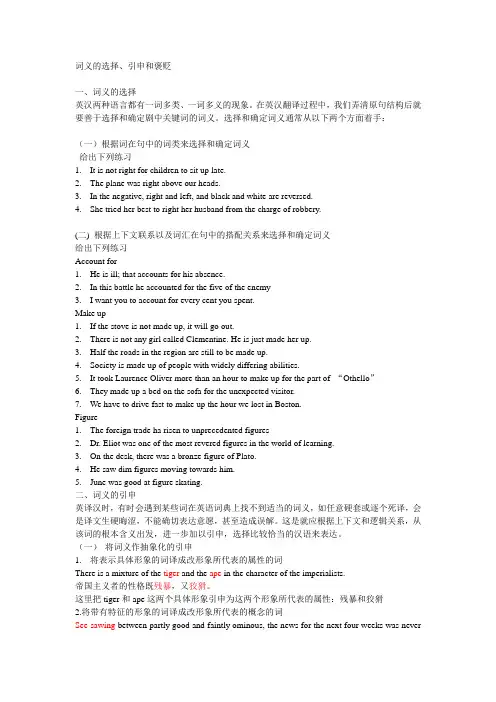
词义的选择、引申和褒贬一、词义的选择英汉两种语言都有一词多类、一词多义的现象。
在英汉翻译过程中,我们弄清原句结构后就要善于选择和确定剧中关键词的词义。
选择和确定词义通常从以下两个方面着手:(一)根据词在句中的词类来选择和确定词义给出下列练习1.It is not right for children to sit up late.2.The plane was right above our heads.3.In the negative, right and left, and black and white are reversed.4.She tried her best to right her husband from the charge of robbery.(二) 根据上下文联系以及词汇在句中的搭配关系来选择和确定词义给出下列练习Account for1.He is ill; that accounts for his absence.2.In this battle he accounted for the five of the enemy3.I want you to account for every cent you spent.Make up1.If the stove is not made up, it will go out.2.There is not any girl called Clementine. He is just made her up.3.Half the roads in the region are still to be made up.4.Society is made up of people with widely differing abilities.5.It took Laurence Oliver more than an hour to make up for the part of “Othello”6.They made up a bed on the sofa for the unexpected visitor.7.We have to drive fast to make up the hour we lost in Boston.Figure1.The foreign trade ha risen to unprecedented figures2.Dr. Eliot was one of the most revered figures in the world of learning.3.On the desk, there was a bronze figure of Plato.4.He saw dim figures moving towards him.5.June was good at figure skating.二、词义的引申英译汉时,有时会遇到某些词在英语词典上找不到适当的词义,如任意硬套或逐个死译,会是译文生硬晦涩,不能确切表达意愿,甚至造成误解。
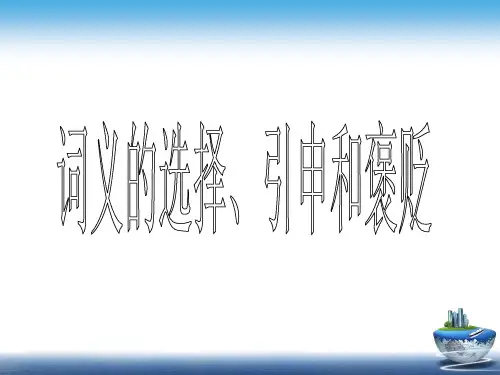
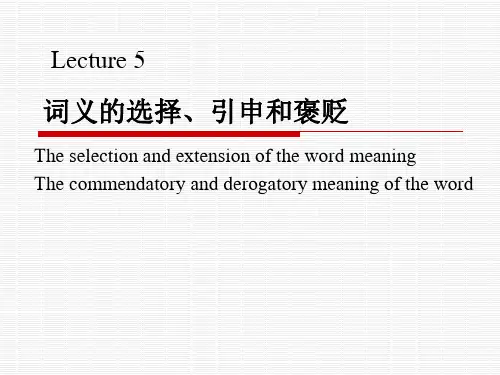
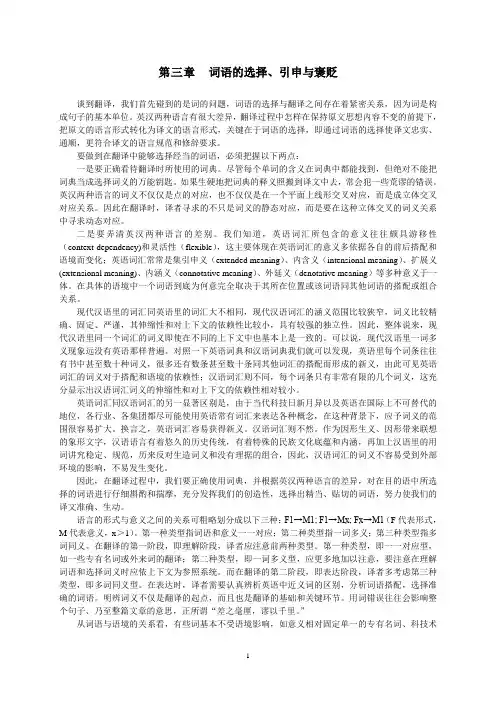
第三章词语的选择、引申与褒贬谈到翻译,我们首先碰到的是词的问题,词语的选择与翻译之间存在着紧密关系,因为词是构成句子的基本单位。
英汉两种语言有很大差异,翻译过程中怎样在保持原文思想内容不变的前提下,把原文的语言形式转化为译文的语言形式,关键在于词语的选择,即通过词语的选择使译文忠实、通顺,更符合译文的语言规范和修辞要求。
要做到在翻译中能够选择经当的词语,必须把握以下两点:一是要正确看待翻译时所使用的词典。
尽管每个单词的含义在词典中都能找到,但绝对不能把词典当成选择词义的万能钥匙。
如果生硬地把词典的释义照搬到译文中去,常会犯一些荒谬的错误。
英汉两种语言的词义不仅仅是点的对应,也不仅仅是在一个平面上线形交叉对应,而是成立体交叉对应关系。
因此在翻译时,译者寻求的不只是词义的静态对应,而是要在这种立体交叉的词义关系中寻求动态对应。
二是要弄清英汉两种语言的差别。
我们知道,英语词汇所包含的意义往往颇具游移性(context-dependency)和灵活性(flexible),这主要体现在英语词汇的意义多依据各自的前后搭配和语境而变化;英语词汇常常是集引申义(extended meaning)、内含义(intensional meaning)、扩展义(extensional meaning)、内涵义(connotative meaning)、外延义(denotative meaning)等多种意义于一体。
在具体的语境中一个词语到底为何意完全取决于其所在位置或该词语同其他词语的搭配或组合关系。
现代汉语里的词汇同英语里的词汇大不相同,现代汉语词汇的涵义范围比较狭窄,词义比较精确、固定、严谨,其伸缩性和对上下文的依赖性比较小,具有较强的独立性。
因此,整体说来,现代汉语里同一个词汇的词义即使在不同的上下文中也基本上是一致的。
可以说,现代汉语里一词多义现象远没有英语那样普遍。
对照一下英语词典和汉语词典我们就可以发现,英语里每个词条往往有书中甚至数十种词义,很多还有数条甚至数十条同其他词汇的搭配而形成的新义,由此可见英语词汇的词义对于搭配和语境的依赖性;汉语词汇则不同,每个词条只有非常有限的几个词义,这充分显示出汉语词汇词义的伸缩性和对上下文的依赖性相对较小。
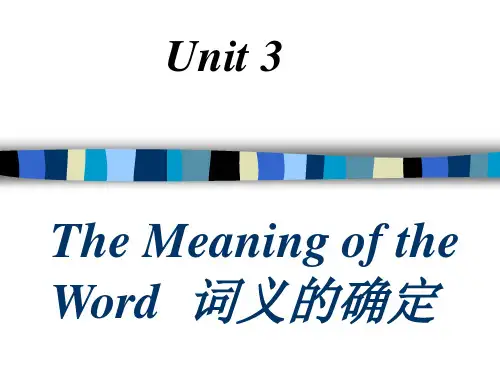
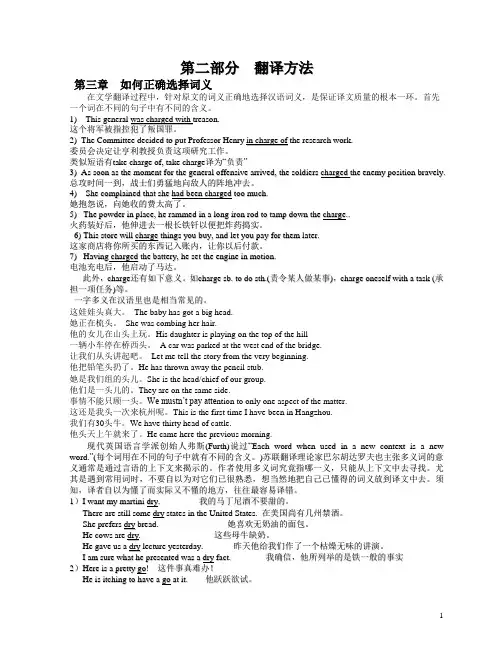
第二部分翻译方法第三章如何正确选择词义在文学翻译过程中,针对原文的词义正确地选择汉语词义,是保证译文质量的根本一环。
首先一个词在不同的句子中有不同的含义。
1)T h i s g e n e r a l w a s c h a r g e d w i t h t r e a s o n.这个将军被指控犯了叛国罪。
2)T h e C o m m i t t e e d e c i d e d t o p u t P r o f e s s o r H e n r y i n c h a r g e o f t h e r e s e a r c h w o r k.委员会决定让亨利教授负责这项研究工作。
类似短语有t a k e c h a r g e o f,t a k e c h a r g e译为“负责”3)A s s o o n a s t h e m o m e n t f o r t h e g e n e r a l o f f e n s i v e a r r i v e d,t h e s o l d i e r s c h a r g e d t h e e n e m y p o s i t i o n b r a v e l y.总攻时间一到,战士们勇猛地向敌人的阵地冲去。
4)S h e c o m p l a i n e d t h a t s h e h a d b e e n c h a r g e d t o o m u c h.她抱怨说,向她收的费太高了。
5)T h e p o w d e r i n p l a c e,h e r a m m e d i n a l o n g i r o n r o d t o t a m p d o w n t h e c h a r g e..火药装好后,他伸进去一根长铁钎以便把炸药捣实。
6)T h i s s t o r e w i l l c h a r g e t h i n g s y o u b u y,a n d l e t y o u p a y f o r t h e m l a t e r.这家商店将你所买的东西记入账内,让你以后付款。
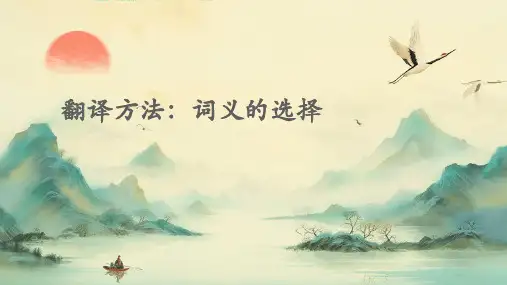
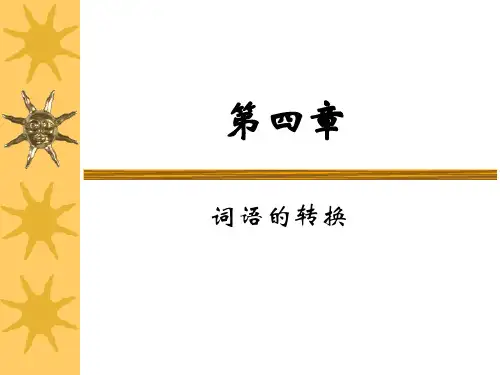
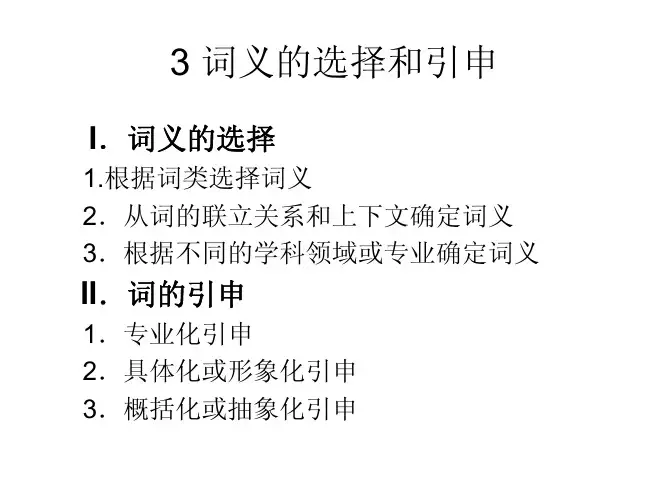
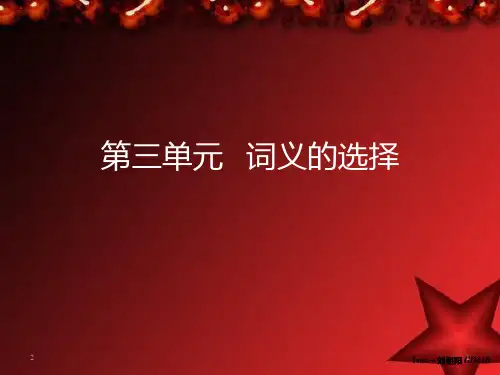
词义的选择、引申及褒贬一、词义的选择英汉两种语言都有一词多类、一词多义的现象。
一词多类就是指一个词往往属于几个词类,具有几个不同的意义。
一词多义就是说同一个词在同一个词类中,又往往有几个不同的词义。
在英汉翻译过程中,我们在弄清原句结构后就要善于选择和确定原句中关键词的词义。
选择和确定词义通常从以下两个方面着手:(一)根据词在句中的词类来选择和确定词义选择某个词的词义,首先要判明这个词在原句中应属哪一种词类,然后再进一步确定其词义。
例如,在like charges repel; unlike charges attract一句中,like用作形容词,它的汉语对应意义是“相同的”,因此全句可以译为:“相同的电荷相斥,不同的电荷相吸”。
但在下面各句中,like又分属其他几个不同词类:1)He likes mathematics more than physics.他喜欢数学甚于喜欢物理学。
(动词)2)In the sunbeam passing through the window there are fine grains of dust shining like gold.在射入窗内的阳光里,细微的尘埃像金子一般在闪闪发亮。
(前置词)3)Like knows like.英雄识英雄。
(名词)(二)根据上下文确定词义除了根据词性来判断词义之外,词义选择一个更为重要的方法就是根据上文来判断词义了。
因为很多英语单词即使弄清楚了词性,但仍须从几个或几十个义项中选定确切的词义。
这就需要借助于上下文提供的各种线索做出合理的分析、推理、判断。
有时候,我们还可能会在考试中碰到生词。
可是,我们绝对不会在一个英语句子中出现这种情况:某一个单词不认识,而这个单词上下文中的所有单词都不认识。
正因为上下文的存在,这也给我们翻译中解决生词提供了突破口。
因此,在翻译中,我们一定要随时注意上下文,上下文的不同在很大程度上决定了单词意义的不同,也在很大程度上决定了翻译中理解和表达的正确性、准确性和译文是否通顺。